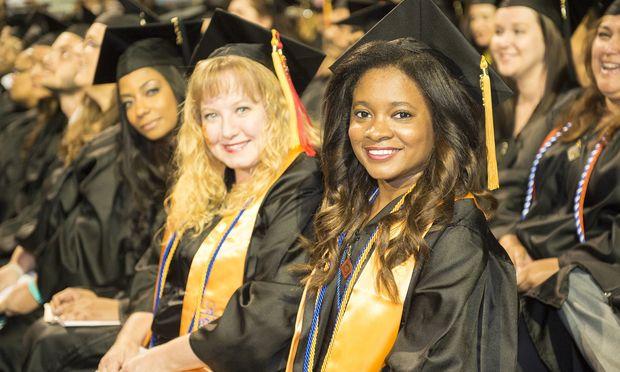This Florida community college was named the best in the nation in 2011. So, what makes it so successful?
Students at Valencia Community College's 2015 graduation ceremony.
A lot of people look down on community colleges and see them as second-rate education institutions. Sandy Shugart, president of Valencia College, a community college in Orlando, Florida, doesn’t think of them that way.
“There was a time, I think, when community colleges were thought of as colleges of last chance. But the truth is we're colleges of choice now,” Shugart says.
Valencia is definitely a college of choice. It was recently recognized with the Aspen Prize for Community College Excellence. Its economic impact on the region is more than $1 billion a year. And two out of three high school graduates in the greater Orlando area who go to college anywhere go to Valencia.
When Shugart sees students on campus, he sees possibilities..
“They're incredibly diverse, and they're always in small groups, and everybody's talking at once. It's a lively, exciting place to be,” Shugart says.
Not all of Valencia’s students breeze through the school problem-free, however. Some four percent of the incoming student population need help with basic reading and writing skills.
“It's darn hard work to get results with students who come with such deep deficits, and so it's very important to us, and yes we do embrace it,” Shugart says. “Valencia's been honored for moving the needle on just those kinds of students, but we feel like we've just begun to scratch the surface.”
Shugart says part of the reason for Valencia’s success is the way it treats its students.
“Somebody is on a first name basis with all of them,” Shugart says. “We call it a radical commitment to personhood and we have deep conversations around the college about how to treat each student as a person and not a number, and it's very practical. There are hundreds of things to be done that convey to students, ‘You matter to us. You're unique. And we want to treat you as a unique human being.’”
Valencia also focuses on practical job training for its students and connecting them to local employers.
“We have 700 local employers represented on our advisory committees who advise us about the competencies they want in a graduate,” Shugart says. “We always begin with what we call employability skills. … In those longer programs — those that lead to associates degrees and bachelor's degrees — we have a different approach. There it's more about formation, and I would tell you the most important part of that is work experience as that's where the kinds of values and soft skills that our employees want are best formed — not in classroom, but on the job.”
One of Valencia’s success stories is a student named Angel. Angel was heavily involved in gang life, committed a serious crime and was arrested at the age of 16, then sentenced to 25 years in prison. While serving time, he decided to turn his life around and he earned his GED.
“When he was getting close to release on parole because he was a model prisoner, he wrote letters to eight colleges saying ‘I'd really like an opportunity,’ and only one responded to him. It was Valencia,” Shugart says. “Angel enrolled at Valencia and he eventually graduated with a 4.0 GPA. He's now at the University of Central Florida with a 4.0 GPA, and an internship in the state senator’s office. And I don't have any doubt that Angel will be a powerful and important leader in America sometime in the not too distant future. One of the reasons we have to invest in reaching out to that four percent is because, as Jefferson said, ‘geniuses will be raked from the coals.’”
This story first aired as an interview on PRI's The Takeaway, a public radio program that invites you to be part of the American conversation.
